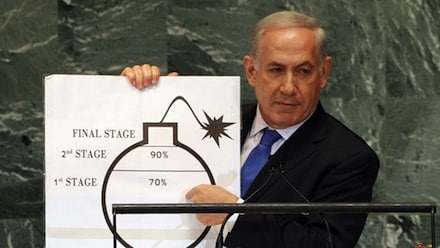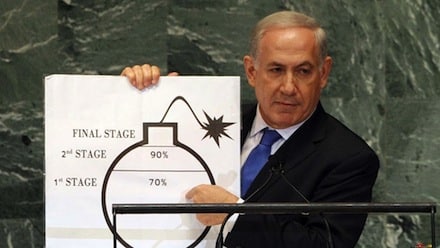
To no surprise, nuclear talks between Iran and major world powers have become stalemated.
Iran will not sink “to its knees” to win a nuclear deal with the great powers, said its leader, Ayatollah Ali Khamenei, after the failure of six months of talks in Vienna.
However, the talks will continue until at least next March. Pity the poor negotiators: besides being excruciatingly boring, dealing with the tough, savvy Iranians is like pulling teeth. The only nationality I ever saw get the better of Iranians in negotiations were Armenians.
The United States has been waging economic and political warfare on the Islamic Republic since 1979. Only Cuba has been pounded longer. Both have suffered hugely.
Of late, Iranian nuclear scientists and technicians have been murdered in broad daylight. Nuclear installations have been sabotaged. The Stuxnet virus allegedly unleashed by the US and Israel against Iran’s centrifuges risked a catastrophic explosion or the release of nuclear contamination. In neighboring, Iraq, some 300 of its former nuclear technicians and scientists have been mysteriously murdered during the US occupation.
Iran’s economy has been very seriously damaged by the US-led boycott and commercial restrictions. Iranians are suffering mounting inflation, shortages of goods, and a collapsing currency. Iranians are fed up being the target of western sanctions.
In a major concession, last summer Iran converted or diluted 200kg of uranium enriched to 20%, rendering it unusable for any potential further enrichment into nuclear weapons fuel.
The UN Atomic Energy Agency certified this procedure. The balance of Iran’s uranium stockpile is at 5% – adequate for energy production but not for weapons. Half its 20,000 centrifuges used to enrich uranium are shut down. UN inspectors or cameras closely watch Iranian nuclear installations – not to mention American and Israeli satellites.
So why does Iran stick to its guns – at least so far – and refuse make a deal limiting or ending its production of nuclear fuel? Why endure all the political and economic punishment and the never very distant threat of attack by the US and/or Israel?
First, because nuclear energy has become a potent nationalist symbol for Iran. Ayatollah Khomeini has repeatedly asserted that what he calls the “western colonial powers” (read the US, Britain, France) have long sought to deny modern technology to the Muslim world in order to keep it backward and dependent on them. This is, of course, just what Imperial Britain did with India.
Iranians point to the dire example of Iraq – the most industrialized and technologically advanced Arab nation – that was destroyed, they say, for this very reason.
A self-sufficient nuclear power industry will help assure Iran’s economic and political independence and a time when oil reserves in this nation of 70 million are falling. Nuclear power is a UN-granted right so long as it stays peaceful. Iran’s nuclear industry has been vigorously inspected for over a decade by the UN, with no major violations discovered.
Ayatollah Khomeini has issued a fatwah (religious decree) banning nuclear weapons, vowing that Iran would never possess or use them. US intelligence has repeatedly stated that Iran has no nuclear weapons.
Ironically, it is the existing declared nuclear powers – the US, Russia, China, France, Britain – who are in violation of the 1970 Non-Proliferation Treaty. The pact denied nuclear weapons to other nations provided that the signatories rapidly eliminate their nuclear arsenals. Four decades later, none have complied with the treaty, while Israel, India, Pakistan and North Korea have all secretly built nuclear arsenals.
But this does not matter to Iran’s many enemies. They continue to raise a hue and cry. Way back in 2006, Israel was claiming Iran would have a nuclear weapon “in six months.” We have heard similar claims ever since.
Since no nuclear weapons have been identified in Iran, its enemies now insist Tehran is taking peaceful nuclear energy to the “breakout” point, from which a dash to nuclear weapons in 3-6 months will be possible. What they don’t discuss is that besides Iran not having any nuclear weapons, it will have a very difficult task miniaturizing and hardening one to fit it into a missile warhead. Tehran lacks reliable, accurate medium-range missiles to deliver a nuclear strike. Its Shahab-3 is a glorified Soviet/North Korean Scud that is wildly inaccurate, mechanically unreliable, and slow to fuel.
Even so, Israel and its US Congressional allies now insist the danger is a mad mullah in Tehran deciding to commit nuclear hara-kiri to destroy Israel. The “mad mullah” was a favorite bogeyman of the Victorian British Empire. Iran’s leadership is neither mad, stupid nor suicidal.
Far more important, who would Iran attack if it had nuclear weapons? The USA or Israel? Iran has no long-range missiles. Iran would be vaporized minutes after launching a nuclear strike. Israel’s extensive nuclear arsenal – missiles, strike aircraft, submarine launched missiles – would survive any surprise first strike. Iran would be quickly destroyed by Israel’s counter-strike.
The real reason for simmering hostility between Israel and Iran is Palestine. Now that most of the feeble Arab states have been removed from the former anti-Israel coalition, the only remaining stalwart defender of Palestinian rights – and opponent of Israel’s total absorption of the West Bank and Golan – is Iran.
For Israel’s security, the best option is to make peace with Iran – which used to be a close ally. But Israel’s current hard right leaders are determined to cement Israel’s rule over the West Bank even if it means risking war with Iran.
Israel cleverly concealed its nuclear weapons program from American inspectors, according to defector Mordechai Vanunu. Israel no doubt fears that Iran is doing exactly the same. My long-standing proposal has been for Israel and Iran to mutually inspect one-another’s nuclear facilities along with UN staff.
But time for a reasonable solution to Iran’s nuclear challenge is running out. Once the Republicans take over the US Senate is January, 2015, Israel’s influence over Congress will become decisive and irresistible. Iran knows this and is feeling the pressure mounting.
Reprinted with author’s permission from his website.

